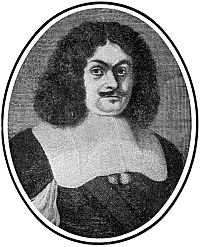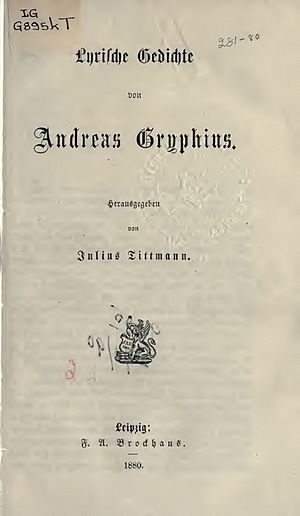Andreas Gryphius facts for kids
Quick facts for kids
Andreas Gryphius
|
|
|---|---|

Engraving by Philipp Kilian
|
|
| Born |
Andreas Greif
2 October 1616 Glogau (Głogów), Silesia
|
| Died | 16 July 1664 (aged 47) Glogau, Silesia
|
| Nationality | German |
| Education | Fraustadt |
| Alma mater | Academic Gymnasium Danzig |
| Occupation |
|
| Era | Baroque-era Germany |
| Movement | German Baroque |
| Spouse(s) |
Rosina Deutschländer
(m. 1649) |
| Children |
|
| Parents |
|
| Signature | |
 |
|
Andreas Gryphius (born Andreas Greif; October 2, 1616 – July 16, 1664) was an important German poet and writer of plays. He is known for his powerful sonnets, which often talked about life's challenges and how quickly things change. He is seen as one of the most significant poets of the Baroque period in German-speaking lands. Gryphius also helped improve the German language and German poetry.
He was born and grew up in Glogau (Głogów), in a region called Silesia. When he was 33, he married Rosina Deutschländer. They had six children together: Christian, Constantin, Anna Rosine, Theodor, Maria Elisabeth, and Daniel.
Contents
Life Story of Andreas Gryphius
Early Years and Education
Andreas Gryphius was the son of Paullus Gryphius, a respected church leader in Glogau. His family name was originally "Greif," but it was changed to the Latin "Gryphius" by his great-grandfather.
Andreas became an orphan at a young age. He also had to leave his hometown because of the Thirty Years' War. This was a very difficult time in Germany. He went to school in different places, but he got a great education in classical subjects at Freistadt (now Wschowa, Poland).
Becoming a Poet: Gryphius's Career
Starting in Danzig and New Poetry
In 1634, Andreas Gryphius moved to Gdańsk, a city then known as Danzig. There, he met professors Peter Crüger and Johann Mochinger. They taught him about a new style of German poetry. Crüger was close friends with Martin Opitz, who was called the 'father of German poetry.' Crüger had a big influence on Gryphius, who even wrote poems dedicated to him. Gryphius wrote poems in both Latin and German, including many sonnets.
Around this time, a printer named Andreas Hünefeld published Opitz's famous book, Buch von der deutschen Poeterey (Book of German Poetry). This book helped shape German poetry. Gryphius was inspired by the busy, international city of Danzig, especially after growing up in war-torn Silesia. In 1635, he published his second long poem, Dei Vindicis Impetus et Herodis Interitus. He dedicated this work to the city council of Danzig.
Becoming a Honored Poet
In 1636, Gryphius published Parnassus renovatus, a poem praising his mentor, Georg Schönborner. Schönborner was a highly educated lawyer and government official. Gryphius later became a tutor for Schönborner's two sons.
Schönborner recognized Gryphius's amazing talent. In 1637, he gave Gryphius the special title of poeta laureatus (a poet honored by the state) and a master of philosophy. He also gave him a noble title, though Gryphius never used it. Sadly, Schönborner passed away less than a month later.
While living with Schönborner, Gryphius finished his first collection of poems called Sonnete ("Sonnets"). It was published in 1637. This collection included some of his most famous poems, like "Es ist alles eitel" (All is vanity), which talked about the effects of war and how short human life is. Other well-known poems were "Menschliches Elende" (Human misery) and "Trawrklage des verwüsteten Deutschlandes" (Lament of devastated Germany).
Studies in Leiden and Dramatic Influences
In 1632, Gryphius had seen the town of Freystadt (now Kożuchów) destroyed by Swedish soldiers. He wrote about this event in his poem Fewrige Freystadt. In 1637, he went to Leiden in the Netherlands to continue his studies. He stayed there for six years, attending and giving lectures. In Leiden, he was greatly influenced by famous Dutch playwrights like Pieter Corneliszoon Hooft and Joost van den Vondel. Their work helped shape his own plays later on.
After the Peace of Prague in 1635, the Habsburg rulers took control of Silesia again. They made it difficult for Protestants and closed their churches. Andreas's brother, Paul Gryphius, who was a Protestant, had to leave Silesia. He found a new position in Brandenburg. Andreas sent him several poems to celebrate his new start.
Travels and Writing Plays
Settling Down and Joining a Literary Group
After traveling through France, Italy, and southern Germany, Gryphius settled in Fraustadt in 1647. This is where he began writing his plays. In 1650, he became a "syndic" (a legal officer) for the city of Glogów, a job he held until he died. Around this time, he also joined the Fruitbearing Society, a literary group started in 1617. Its goal was to improve the German language and literature, similar to Italian academies.
Themes in Gryphius's Works
Gryphius grew up during the Thirty Years' War, a time when much of Germany was destroyed. This experience deeply affected him. He saw the child of a friend die and helped another friend prepare for his own death. Because of these sad experiences, his poems often show a sense of sadness and a focus on how temporary life is. His most famous work reflecting this is Kirchhofsgedanken ("Cemetery thoughts," 1656).
Comedies and Tragedies
Gryphius is also known for his comedies. One of his comedies, Absurda Comica, oder Herr Peter Squentz (1663), is based on the funny story of Pyramus and Thisbe from Shakespeare's A Midsummer Night's Dream. Another comedy, Die geliebte Dornrose (1660), was written in the Silesian dialect and is known for its simple and charming style. Horribilicribrifax (1663) is a comedy that makes fun of overly scholarly or pedantic people.
Besides comedies, Gryphius wrote five tragedies. These plays often had grand and dramatic language, but Gryphius tried to create well-planned stories. Sometimes, his plays showed strong emotions and imagination. He was inspired by ancient Roman playwrights like Seneca the Younger and Dutch writers like Joost van den Vondel. In Carolus Stuardus (1657), he wrote about events happening in his own time, like the death of King Charles I of England. His other tragedies include Leo Armenius (1650), Catharina von Georgien (1657), Cardenio und Celinde (1657), and Papinianus (1659). Before Gryphius, no German playwright had reached such a high level, and it took a long time for others to follow his example.
Works by Andreas Gryphius
Latin Works
- Herodis Furiae et Rachelis lachrymae, Głogów 1634
- Dei Vindicis Impetus et Herodis Interitus, Gdańsk 1635
- Parnassus renovatus, Gdańsk 1636
- Epigrammata liber I, Leiden 1643
- Olivetum Libri three, Florence 1646
Lyric Poems
- Sonette (Lissaer Sonette), Lissa 1637
- Son- und Feyrtags-Sonette, Leiden 1639
- Sonette Das erste Buch, Leiden 1643
- Oden Das erste Buch, Leiden 1643
- Epigrammata. Das erste Buch, Leiden 1643
- Gedanken über den Kirchhof und Ruhestätte der Verstorbenen (Thoughts on the Cemetery and Resting Place of the Deceased), Wrocław 1657
Tragedies (Plays)
- Ein Fürsten-Mörderisches Trawer-Spiel / genant. Leo Armenius (A Prince-Murdering Tragedy, called Leo Armenius), Frankfurt am Main 1650
- Catharina von Georgien Oder Bewehrete Beständigkeit. Tragedy (Catherine of Georgia or Proven Constancy), Wrocław 1657
- Cardenio vnd Celinde, Oder Unglücklich Verliebete. Tragedy (Cardenio and Celinde, or Unhappily in Love), Wrocław 1657
- Ermordete Majestät. Oder Carolus Stuardus König von Groß Britannien. Tragedy (Murdered Majesty, or Charles Stuart King of Great Britain), Wrocław 1657; revised version: Breslau 1663
- Großmüttiger Rechts-Gelehrter / Oder Sterbender Aemilius Paulus Papinianus. Tragedy (Magnanimous Jurist, or Dying Aemilius Paulus Papinianus), Wrocław 1659
Comedies (Plays)
- Absurd Comic oder Herr Peter Squenz / Schimpff-Spiel (Absurd Comedy or Mr. Peter Squenz / Farce), Wrocław 1658
- Horribilicribrifax Teutsch, Wrocław 1663
- Verlibtes Gespenste / Gesang-Spil. Die gelibte Dornrose / Schertz-Spil in Silesian dialect (Love-Struck Ghost / Musical Play. The Beloved Rose with a Thorn / Farce in Silesian dialect), Wrocław 1660
Prose Works
- Fewrige Freystadt (Fiery Freystadt), Lissa 1637
- Mumiae Wratislavienses, Wrocław 1662
- Funeral Dissertationes. Oder Leich-Abdanckungen (Funeral Dissertations, or Funeral Speeches), Leipzig 1667
Other Dramas
- Cardenio and Celinde (1647) – tragedy
- Leo Arminius (1650) – historical tragedy
- Carolus Stuardus (1657 – first version; 1663 – second version) – historical tragedy
- Catharina von Georgien (1657) – historical tragedy
- Absurda Comica oder Herr Peter Squenz (1658) – comedy
- Papinianus (1659) – historical tragedy
- The Beloved Rose with a Thorn (1661) – comedy
- Horribilicribrifax (1663) – comedy
Images for kids
See also
 In Spanish: Andreas Gryphius para niños
In Spanish: Andreas Gryphius para niños
 | Lonnie Johnson |
 | Granville Woods |
 | Lewis Howard Latimer |
 | James West |



